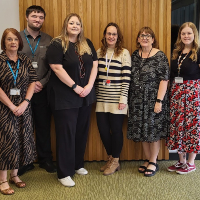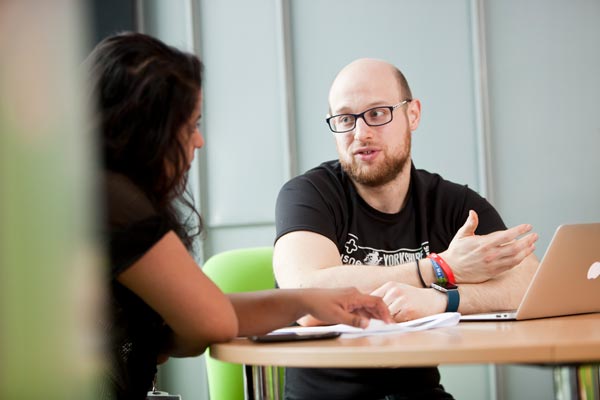View semester dates

BSc (Hons) Business and Management (with a year in industry)
Develop your analytical, problem-solving and decision-making skills at the cutting edge of effective and ethical business management.
Year of entry: 2026/27
View semester dates
In an increasingly cutthroat global economy, we aim to create reflective, socially and ethically aware specialists in operations management.
You’ll learn to identify problems, gather relevant information and analyse your data to make decisions and take action.
More mathematically rigorous than the equivalent BA, the BSc in Business and Management is a well-balanced degree that will prepare you to make complex decisions in a volatile global marketplace. Your year in industry will give you the chance to put your skills into practice at the cutting edge of management theory, then draw on your first-hand experience to inform your final year of study.
This course is available as a three-year degree, without a year in industry: Business and Management (BSc).
Course content
Our business and management, accounting and finance degrees share some common elements in Year 1 to introduce you to the core concepts underpinning these key disciplines.
As you progress, you'll develop the knowledge and skills acquired in your first year, giving both depth and breadth to your learning, with an emphasis on mathematical skills and statistical analysis. You'll be able to choose option modules to widen your knowledge or bring your specialism into focus.
In your third year, you'll undertake a 12-month paid placement in industry. You'll develop your understanding of business and management, apply the theories you've learned and enhance your employability.
Year 1
In Year 1, you'll study modules which introduce some of the key concepts and techniques used in business and management. The modules give a broad overview of topics you may want to specialise in, with assessments designed to develop your academic skills. You'll enhance your understanding of accountancy and statistical research methods.
Core modules
- Intro to Business Ethics and Sustainability
- Introduction to Accounting
- Humanity, Economics and Management
- History of Management
- Quantitative Analysis in Management
- Marketing Principles and Practice
Academic integrity module
In addition to the above you will also need to complete our online Academic Integrity module.
Year 2
In Year 2 you'll develop your understanding further and explore some new areas of study. Modules build on the concepts introduced in Year 1, expanding your understanding of key topics, research techniques and practical skills.
Core modules
- Business Planning and Sustainable Entrepreneurship
- Strategic Management
- Project and Operations Management
- Management Information Systems
Option Modules
You will also study two option modules. In previous years, options have covered topics such as:
- Management of Human Resources
- Innovation and Creativity within Organisations
- Employment Relations
- Intermediate Management Accounting
- Financial Reporting
- Behaviour in Organisations
- Future of Food
- Management in the Age of Artificial Intelligence
- Behaviour in Organisations
- Future of Food
- Management in the Age of Artificial Intelligence
You can also choose to add a placement in industry before your final year.
Year 3
Our in-school Placements Team advertises hundreds of vacancies each year. You can find placements in all sorts of industries, all over the world. The process of applying is intensive and competitive, so the team will work with you from the beginning of your course to guide you in your choice of placement and prepare you for applying.
In recent years, placements for BSc Business and Management students have included:
- Asda Logistics Services
- BDO Global
- BMW
- EY - Ernst & Young LLP
- Haleon
- L’Oréal
- Pfizer UK Limited
- RSM
- Sony
- The Walt Disney Company
Before starting a placement that forms part of your course, you are likely to be asked by the placement provider to sign a confidentiality agreement. This is to ensure that you do not disclose any information that is confidential to the placement provider.
Year 4
In your final year you'll develop new skills, take a closer look at topics you're familiar with, or investigate an interesting subject in detail. In addition to your core modules, you can choose to take option modules, or a dissertation based on an original research project with fewer option modules.
Core modules
Option modules
You will also study three option modules. In previous years, options have covered topics such as:
- Innovation and Firm Competitiveness
- The Literature and Art of Management
- Globalisation, Politics and Culture
- The Dark Side of Organisation
- International Perspectives on Leaders and Leadership
- Applied HR, Business and Society
- Managing Professional Service Firms
- Industrial and Corporate Change
- Taxation Systems
- Management Accounting and Control Systems
- Managing Diversity
- International and Comparative Employment Relations
- Sustainability and Business
- Strategic Management of Risk
- Managing and Leading Change
- Company Law
- Management, Technology and Society
- Cyber Security for Managers
- Marketing and Innovation Management
- Rethinking Management Knowledge
- Dissertation
The dissertation is completed over the whole year. If you choose to undertake a dissertation you will only study one additional option module.
A dissertation draws on the knowledge and skills you have developed throughout your degree. You'll collect and analyse empirical data to illuminate or solve a complex issue or problem in the field of accounting, business finance and management. You'll write a longer and more complex document, sustaining a well-reasoned argument and drawing sound conclusions.
Our modules may change to reflect the latest academic thinking and expertise of our staff, and in line with Department/School academic planning.
Learning outcomes
Every course at York has been designed to provide clear and ambitious learning outcomes. These learning outcomes give you an understanding of what you will be able to do at the end of the course. We develop each course by designing modules that grow your abilities towards the learning outcomes and help you to explain what you can offer to employers. Find out more about our approach to teaching and learning.
Learning outcomes for this course
- Promote reflective, internationally, socially, and ethically-aware approaches and principles to complex business situations and planning.
- Diagnose and solve problems in business and management by applying management and operations theory to specific cases;
- manage business, management and operational information by assessing the quality of the evidence base, identifying gaps and inadequacies, and using suitable methods to collect and collate relevant data.
- Make robust, evidence-based strategic and operational decisions by critically analysing textual and numerical information and data using appropriate qualitative and quantitative techniques.
- Develop specific management and operational proposals and deliver recommendations by presenting relevant, appropriately detailed information, coherently, articulately and confidently.
- Evaluate the impact at an operational level of putting managerial decisions into practice, taking into account time and resource constraints.
- Liaise and work with others on team projects in a professional and collegial manner.
- Adapt to different management situations and correct for the differences between theory and practice by reflecting on first-hand experience, evaluating personal strengths and weaknesses, and keeping up-to-date with relevant business ideas.
- Adapt to different management situations and correct for the differences between theory and practice by reflecting on first-hand experience, evaluating personal strengths and weaknesses, and keeping up-to-date with relevant business ideas with resilience as a goal for the organisations.
- Use intercultural understanding /awareness to adapt to culturally different management situations, to deal with people of other cultures, and to adjust and apply business and management theory and concepts to solve real-world business and management problems in different cultural contexts.
Fees and funding
The fees and funding information here is for students starting in the 2026/27 academic year.
If you take a year abroad or year in industry you'll pay a reduced rate of fees for that year.
Annual tuition fees
| UK (home) | International and EU |
|---|---|
| £9,535 (TBC) | £27,500 |
The UK government has announced its intention to increase tuition fees from £9,535 to £9,790 for the 2026/27 academic year. We expect this to apply to new UK (home) undergraduate students starting their studies in September 2026.
UK (home) or international fees?
The level of fee that you will be asked to pay depends on whether you're classed as a UK (home) or international student. Check your fee status.
Fees for subsequent years
- UK (home) fees may increase within the government fee cap in subsequent academic years. We will notify you of any increase as soon as we can.
- International fees are subject to increase in subsequent years in line with the prevailing Consumer Price Index (CPI) inflation rate (up to a maximum of 10%).
More information
For more information about tuition fees, any reduced fees for study abroad and work placement years, scholarships, tuition fee loans, maintenance loans and living costs see undergraduate fees and funding.
Additional costs
You may find it useful to buy textbooks, and for some modules this may be required. Textbooks usually cost around £30 - £60 each.
Funding
We'll confirm more funding opportunities for students joining us in 2026/27 throughout the year.
York, Oxford, Cambridge, Imperial
Just four UK universities are rated Gold for teaching and top ten for research* in the latest national assessment exercises.
* Awarded joint 10th in the Times Higher Education ranking of the Research Excellence Framework 2021.
Teaching and assessment
You’ll study and learn with academics who are active researchers, experts in their field and have a passion for their subjects. Our approach to teaching will provide you with the knowledge, opportunities, and support you need to grow and succeed in a global workplace. Find out more about our approach to teaching and learning.
Teaching format
We focus on teaching the skills and expertise that employers want. We use practical problems and case studies from our industrial partners to ensure our modules are relevant to modern industry. Our passionate tutors' research-led teaching puts you at the forefront of current issues in business and management.
We use a wide range of teaching methods to suit different learning styles, including:
- Lectures
- Small-group seminars
- Activity-based workshops
- Group projects
- Individual projects
Our courses are designed to encourage you to take responsibility for your own learning and development, but with all the support you need available from our academics.
Timetabled activities
In your first year, you can expect:
| Lectures | 3-6 hours per week |
|---|---|
| Seminars | 4 hours per week |
| Workshops | 3-4 hours per term |
These figures are representative of a typical week. Your contact hours will vary throughout the year due to your module choices, non-compulsory classes, exam periods and changes to scheduled activities.
Outside your timetabled hours, you'll study independently. This may include preparation for classes, follow-up work, wider reading, practice completion of assessment tasks, or revision.
In the UK, full-time students are expected to spend 1,200 hours a year learning. That's about 40 hours of classes and independent study each week during semesters. Everyone learns at a different rate, so the number of hours you spend on independent study will be different to other students on your course.
Teaching location
You will be based in the School for Business and Society on Campus West. Most of your teaching will take place in the Church Lane Building, with additional contact hours elsewhere on Campus East and Campus West.
About our campus
Our beautiful green campus offers a student-friendly setting in which to live and study, within easy reach of the action in the city centre. It's easy to get around - everything is within walking or pedalling distance, or you can use the fast and frequent bus service. Take a campus tour.
Assessment and feedback
You will be assessed using a mixture of essays, projects and examinations. For some modules you'll produce reports, strategy documents or group presentations.
In your final year you will have some scope to choose forms of assessment that you prefer through selection of optional modules. You can pick modules which emphasise presentation skills, essay writing or exams. You could choose to work on an extended dissertation based on your own research and analysis of a current issue or problem in management.
Careers and skills
Our bespoke employability sessions help you identify and improve your skills. Our dedicated support team will help you to build an employability portfolio and to present yourself at your best for the next step of your career.
Our graduates go on to careers in all aspects of business and management. Many progress to postgraduate degrees at York and other leading universities.
Career opportunities
Recent graduates' positions include:
- Accounting Technician
- Area Manager
- Assistant Manager
- Research executive
- Media Assistant
- Audit Associate
- Sales Associate
- Audit Assistant
- Property Manager
See our graduates' careers in roles around the world
Transferable skills
- Critical thinking
- Problem solving
- Communication, presentation and reporting
- Numeracy and data analysis
- Time management
- Teamwork and leadership
- Negotiation and persuasion
The focus is on creating a springboard for success. The studies here at York are just as concerned with the academical aspect as with the implementation of gained knowledge and skills in real life. It is a great way of preparing you for a successful future.
Entry requirements
| Qualification | Typical offer |
|---|---|
| A levels | AAB |
| Access to Higher Education Diploma | 36 credits at Distinction and 9 credits at Merit or higher. |
| BTEC National Extended Diploma | DDD |
| European Baccalaureate | 80% overall |
| International Baccalaureate | 35 points |
| T levels | Distinction overall including grade A in the Core T Level subjects in Accounting; Design and Development for Engineering and Manufacturing; Design, Surveying and Planning for Construction; Digital Business Services; Digital Production, Design and Development; Digital Support and Services; Engineering, Manufacturing, Processing and Control; Finance; Health; Healthcare Science; Legal Services; Maintenance, Installation and Repair for Engineering and Manufacturing; Management and Administration; Marketing; Science |
| Scottish Highers / Advanced Highers | Scottish Highers - AABBB Advanced Highers - not required for entry We may also be able to consider three Advanced Highers or a combination of Highers and Advanced Highers, where an applicant does not meet the grade requirement through Highers alone. Please contact us to discuss your qualifications. |
| International foundation programme | Foundation Certificate from our International Pathway College or an appropriate alternative. |
| Other international qualifications | Equivalent qualifications from your country |
Additional requirements
We also require GCSE Mathematics at grade 5 (B) or equivalent. We do not accept adult numeracy in lieu of GCSE Maths.
Alternative offers
Meeting the following additional criteria may qualify you for an alternative offer.
| Criteria | Adjustment |
|---|---|
| Widening participation | BBC This is conditional upon successful completion of the WP programme including the YorJourney module (Black Access Programme, Next Step York) or successful completion of Realising Opportunities More about widening participation. |
| Contextual offer | BBB |
| EPQ | If you achieve B or higher in the EPQ, you may be eligible for an alternative offer up to one A level grade (or equivalent) below our typical offer. |
| Core Maths | If you achieve B or higher in Core Maths, you may be eligible for an alternative offer up to one A level grade (or equivalent) below our typical offer. |
English language
If English isn't your first language you may need to provide evidence of your English language ability. We accept the following qualifications:
| Qualification | Minimum requirement |
|---|---|
| IELTS (Academic) | 6.5, with a minimum of 6.0 in each component |
| IB English | A score of 4 in English A or 5 in English B (Higher Level or Standard Level) |
| Cambridge CEFR | 176, with a minimum of 169 in each component |
| Oxford ELLT | 7, with a minimum of 6 in each component |
| Oxford Test of English Advanced | 136, with a minimum of 126 in each component |
| Duolingo | Integrated subscores: 120 overall, with a minimum of 105 in each component |
| GCSE/IGCSE/O level English Language (as a first or second language) | Grade C / Grade 4 |
| LanguageCert SELT | B2 with a minimum score of 33/50 in each component |
| LanguageCert Academic | B2 with a minimum score of 33/50 in each component |
| Kaplan Test of English Language | 478 Main Flight score with 444 in each component |
| Skills for English | B2: Merit overall, with Pass with Merit in each component |
| PTE Academic | 61, with a minimum of 55 in each component |
| TOEFL | 87 overall, with a minimum of 21 in each component (taken before January 2026) 4.5 with 5 in Listening and 4.5 in each other component (taken after January 2026) |
| Trinity ISE III | Merit in all components |
| Other English language qualifications | We also accept other English Language qualifications, including various school-leaving certificates. |
For more information see our undergraduate English language requirements.
If you haven't met our English language requirements
You may be eligible for one of our pre-sessional English language courses. These courses will provide you with the level of English needed to meet the conditions of your offer.
The length of course you need to take depends on your current English language test scores and how much you need to improve to reach our English language requirements.
After you've accepted your offer to study at York, we'll confirm which pre-sessional course you should apply to via You@York.
Next steps
Contact us
Get in touch if you have any questions

Department
Related courses
- Business and Management (BSc)
- Business and Management (with a year in industry) (BA)
- Accounting, Business Finance and Management (with a year in industry) (BSc)
- Actuarial Science (with a year in industry) (BSc)
- Mathematics and Management (with a year in industry) (BSc)
- Business and Society (with a year in industry) (BA)
Discover York








